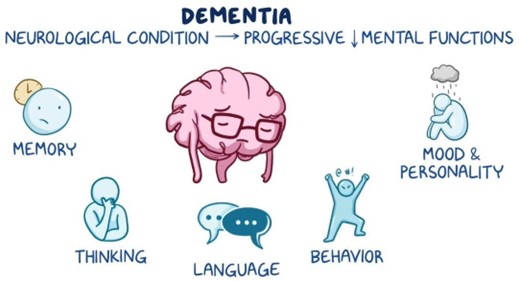A client with chronic alcoholism has been found to have Wernicke encephalopathy. What is this irreversible complication characterized by?
Thiamine deficiency
Hypothalamic and mammillary body lesions
Inability to learn new skills and short-term memory loss
Double vision and rapid eye movement
The Correct Answer is B
A. Wernicke encephalopathy is caused by thiamine (Vitamin B1) deficiency, but it is not characterized by thiamine deficiency itself.
B. Wernicke encephalopathy is characterized by lesions in the hypothalamus and mammillary bodies in the brain.
C. While cognitive impairment may be present, this is not the primary characteristic of Wernicke encephalopathy.
D. Double vision and rapid eye movement are symptoms of Wernicke encephalopathy, but they are not the irreversible complication itself.
Nursing Test Bank
Naxlex Comprehensive Predictor Exams
Related Questions
Correct Answer is A
Explanation
A. "He may begin to try to cover recognition of his memory loss by creating events." As
dementia progresses, individuals may experience confabulation, which involves creating false memories to compensate for memory loss. This is a common symptom seen in the middle stages of dementia.
B. "He may have difficulty in a motor skill such as walking." While motor skills may be affected in the later stages of dementia, it is not typically one of the early signs.
C. "The inability to communicate with speech comes immediately after the early signs." This statement is not accurate. Communication difficulties may occur in later stages, but it is not an immediate progression from early signs.
D. "He may not recognize you and other people who have been in his life." This symptom, known as agnosia, may occur in later stages of dementia, but it is not one of the early signs.

Correct Answer is ["B","C","D"]
Explanation
A) Incorrect. While it's important to avoid dehydration, this option is not specific to lithium use.
B) Correct. Lithium can cause dehydration, so it's crucial for the client to drink adequate fluids daily.
C) Correct. A low sodium diet is important while taking lithium, as high sodium levels can affect lithium absorption and potentially lead to toxicity.
D) Correct. Routine blood work is necessary to monitor lithium levels and ensure the client's levels remain within the therapeutic range.
E) Incorrect. Dependency is not a common concern with lithium.
Whether you are a student looking to ace your exams or a practicing nurse seeking to enhance your expertise , our nursing education contents will empower you with the confidence and competence to make a difference in the lives of patients and become a respected leader in the healthcare field.
Visit Naxlex, invest in your future and unlock endless possibilities with our unparalleled nursing education contents today
Report Wrong Answer on the Current Question
Do you disagree with the answer? If yes, what is your expected answer? Explain.
Kindly be descriptive with the issue you are facing.
